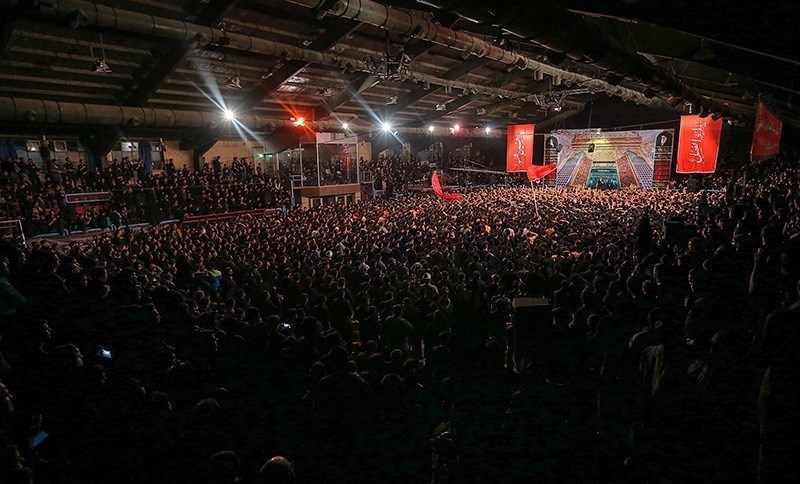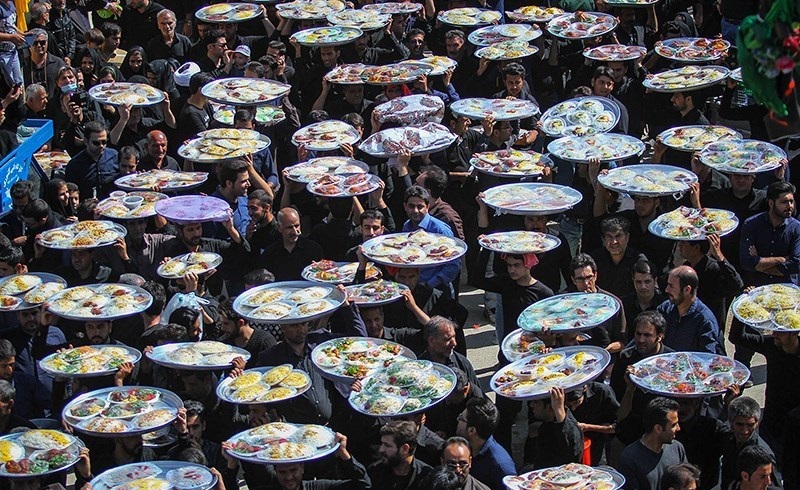|
Noha
A Nowheh, Nohay or Noha ( ''nowheh'', ; translit. ''nūḥa/nawḥa''; ), when interpreted in light of Shia views, is an elegy about the martyrdom of Husayn ibn Ali and his family and companions in the Battle of Karbala. Marsiya and Nowheh have the historical and social milieu of pre-Islamic Arabic and Persian language, Persian culture. The sub-parts of Marsiya are called Nowheh and Soaz (poem), Soaz, which means lamentation. It is usually a poem of mourning. Lamentation has a central part in the literature of the followers and devotees of the Shia sect and its offshoots. The tradition of elegizing Hussain and the tragedy of Karbala is not limited to Arabic or Persian speaking poets. Poets from different languages have also contributed significant poetic literature in their language. Poets who recite nowheh are called nohakhawan. In Urdu language, a number of poets like, Mir Anis and Mirza Dabeer have contributed much to Marsiya and its sub-branch, Nowheh. In like manner, Eng ... [...More Info...] [...Related Items...] OR: [Wikipedia] [Google] [Baidu] |
Mirza Dabeer
Mirza Salaamat Ali Dabeer (), (29 August 1803 – 6 March 1875) was an Urdu poet who excelled and perfected the art of Marsiya writing. He is considered the leading exponent of Marsiya Nigari or marsiya writing along with Mir Anees. Mirza Dabeer was born in 1803 in Delhi. He started reciting marsiya since childhood during muharram ceremonial gatherings called majalis (singular-majlis). He started writing poetry under the tutelage of Mir Muzaffar Husain Zameer. Dabeer himself was an erudite scholar of his time. He migrated from Delhi to Lucknow, where he found suitable environment to develop and demonstrate his skills in marsiya writing. According to Maulana Muhammad Husain Azad in Aab-e-Hayat quoting Tazkira-e-Sarapa Sukhan, there is confusion regarding his father's name because of two different names mentioned in Tazkira-as-Ghulam Husain /Mirza Agha Jan Kaghazfarosh. Mirza Dabeer died in Lucknow in 1875 and is buried there. Works According to Muhammad Husain Azad in Aab ... [...More Info...] [...Related Items...] OR: [Wikipedia] [Google] [Baidu] |
Soaz (poem)
Soaz or soz (Persian and Urdu: سوز) is an elegiac poem written to commemorate the honor of Husain ibn Ali and his family and companions in the battle of Karbala. In its form the soaz, salam and Marsiya are similar, each consisting of a rhyming quatrain and a couplet on a different rhyme. This form found a specially congenial soil in Lucknow (a city in Northern India), chiefly because it was the center of the Shia Muslim community, which regarded it an act of piety and religious duty to eulogize and bemoan the martyrs of the battle of Karbala. The form reached its peak in the writing of Mir Babar Ali Anis. A soaz is written to commemorate the honor of the Ahl al-Bayt, Imam Hussain and the Battle of Karbala. The sub-parts of Marsiya can be called ''noha'' and ''soz'', which mean the lamentation and the burning of the heart, respectively. People who recite soaz are known as soazkhawan. See also * Syed Ali Ausat Zaidi, Prominent Urdu Soazkhawan *Marsiya *Noha *Rawda Khwani ... [...More Info...] [...Related Items...] OR: [Wikipedia] [Google] [Baidu] |
Rawda Khwani
Rozeh Khani or Rawda khwani (, "reading the Rozeh") is the Shia Iranian Muslim ritual of the Mourning of Muharram. It is held every day of the year to commemorate the death of Husayn ibn Ali and his followers during the Battle of Karbala. Performance Rawda khwani as public lamentation is held to commemorating the death of Husayn ibn Ali and his follower, suffering of his family during the Battle of Karbala especially by Iranian Shia Muslims. During this ritual mourning, the Rawda khwan (story teller) recites loudly chapters of the Garden of the Martyrs with innovative skills to mourners. The ritual of Rawda khwani can be held anywhere, such as public squares of cities and villages, yards of mosque or privet house, Hussainiya and the Tekyeh that were built from the eighteenth century for performing the Mourning of Muharram. At first, this ritual mourning was held through the first ten days of the month of Muḥarram and then Rawda was commemorated in Muharram and Safar but nowa ... [...More Info...] [...Related Items...] OR: [Wikipedia] [Google] [Baidu] |
Mourning Of Muharram
Mourning of Muharram (; ; ) is a set of religious rituals observed by Shia Islam, Shia Muslims during the month of Muharram, the first month of the Islamic calendar. These annual rituals commemorate the death of Husayn ibn Ali, grandson of the Prophets and messengers in Islam, Islamic prophet Muhammad and the third Imamate in Shia doctrine, Shia imam. Husayn and his small retinue were slaughtered in the Battle of Karbala on 10 Muharram 61 Islamic calendar, AH (680 Common Era, CE) against the army of the Umayyad Caliphate, Umayyad caliph Yazid I (). The battle followed Husayn's refusal to pledge his allegiance to Yazid, who is often portrayed by Muslims, Muslim historians as impious and immoral. In Shia Islam, Karbala symbolizes the eternal struggle between good and evil, the pinnacle of self-sacrifice, and the ultimate sabotage of Muhammad's prophetic mission. Historically, the event served to crystallize the Shia community into a distinct sect and remains an integral part of th ... [...More Info...] [...Related Items...] OR: [Wikipedia] [Google] [Baidu] |
Elegy
An elegy is a poem of serious reflection, and in English literature usually a lament for the dead. However, according to ''The Oxford Handbook of the Elegy'', "for all of its pervasiveness ... the 'elegy' remains remarkably ill defined: sometimes used as a catch-all to denominate texts of a somber or pessimistic tone, sometimes as a marker for textual monumentalizing, and sometimes strictly as a sign of a lament for the dead". History The Greek term ἐλεγείᾱ (''elegeíā''; from , , ‘lament’) originally referred to any verse written in elegiac couplets and covering a wide range of subject matter (death, love, war). The term also included epitaphs, sad and mournful songs, and commemorative verses. The Latin elegy of ancient Roman literature was most often erotic or mythological in nature. Because of its structural potential for rhetorical effects, the elegiac couplet was also used by both Greek and Roman poets for witty, humorous, and satirical subject matter. O ... [...More Info...] [...Related Items...] OR: [Wikipedia] [Google] [Baidu] |
Nuha (other) , a Shia lament.
{{disambig ...
*Nuha (deity), a deity worshipped among the Northern Arabian tribes of pre-Islamic Arabia *Shaki, Azerbaijan, a city in northwestern Azerbaijan also known as ''Nukha'' *Noha A Nowheh, Nohay or Noha ( ''nowheh'', ; translit. ''nūḥa/nawḥa''; ), when interpreted in light of Shia views, is an elegy about the martyrdom of Husayn ibn Ali and his family and companions in the Battle of Karbala. Marsiya and Nowheh hav ... [...More Info...] [...Related Items...] OR: [Wikipedia] [Google] [Baidu] |
Persian Language
Persian ( ), also known by its endonym and exonym, endonym Farsi (, Fārsī ), is a Western Iranian languages, Western Iranian language belonging to the Iranian languages, Iranian branch of the Indo-Iranian languages, Indo-Iranian subdivision of the Indo-European languages. Persian is a pluricentric language predominantly spoken and used officially within Iran, Afghanistan, and Tajikistan in three mutual intelligibility, mutually intelligible standard language, standard varieties, respectively Iranian Persian (officially known as ''Persian''), Dari, Dari Persian (officially known as ''Dari'' since 1964), and Tajik language, Tajiki Persian (officially known as ''Tajik'' since 1999).Siddikzoda, S. "Tajik Language: Farsi or not Farsi?" in ''Media Insight Central Asia #27'', August 2002. It is also spoken natively in the Tajik variety by a significant population within Uzbekistan, as well as within other regions with a Persianate society, Persianate history in the cultural sphere o ... [...More Info...] [...Related Items...] OR: [Wikipedia] [Google] [Baidu] |
Urdu
Urdu (; , , ) is an Indo-Aryan languages, Indo-Aryan language spoken chiefly in South Asia. It is the Languages of Pakistan, national language and ''lingua franca'' of Pakistan. In India, it is an Eighth Schedule to the Constitution of India, Eighth Schedule language, the status and cultural heritage of which are recognised by the Constitution of India. Quote: "The Eighth Schedule recognizes India's national languages as including the major regional languages as well as others, such as Sanskrit and Urdu, which contribute to India's cultural heritage. ... The original list of fourteen languages in the Eighth Schedule at the time of the adoption of the Constitution in 1949 has now grown to twenty-two." Quote: "As Mahapatra says: "It is generally believed that the significance for the Eighth Schedule lies in providing a list of languages from which Hindi is directed to draw the appropriate forms, style and expressions for its enrichment" ... Being recognized in the Constitution, ... [...More Info...] [...Related Items...] OR: [Wikipedia] [Google] [Baidu] |
Mir Anis
Mir Babar Ali Anees (, 1800-1874), also known as Mir Anees was an Indian Urdu poet. He used his pen-name (takhallus) of Anees (Urdu: , ''Anees'' means "close friend, companion") in poetry. Anees used Persian, Urdu, Arabic, and Sanskrit words in his poetry. Anees wrote prolonged Marsias, which was a custom of his times, but nowadays only selected sections are narrated even in religious ceremonies. He died in 1291 Hijra, corresponding with 1874 CE. Family Mir Babar Ali Anis was born in 1803 CE at Faizabad. In his book ''Khandaan- e-Mir Anees ke Naamwar Sho’ara'' (Famous Poets from the family of Mir Anis), Zameer Naqvi lists 22 poets from Mir Anis’ family and their poetry. A researcher in Urdu Literature, Syed Taqi Abedi, has shown that Mir Anis's family has written poetic literature for three centuries, first in Persian and later in Urdu. [...More Info...] [...Related Items...] OR: [Wikipedia] [Google] [Baidu] |
Arabic
Arabic (, , or , ) is a Central Semitic languages, Central Semitic language of the Afroasiatic languages, Afroasiatic language family spoken primarily in the Arab world. The International Organization for Standardization (ISO) assigns language codes to 32 varieties of Arabic, including its standard form of Literary Arabic, known as Modern Standard Arabic, which is derived from Classical Arabic. This distinction exists primarily among Western linguists; Arabic speakers themselves generally do not distinguish between Modern Standard Arabic and Classical Arabic, but rather refer to both as ( "the eloquent Arabic") or simply ' (). Arabic is the List of languages by the number of countries in which they are recognized as an official language, third most widespread official language after English and French, one of six official languages of the United Nations, and the Sacred language, liturgical language of Islam. Arabic is widely taught in schools and universities around the wo ... [...More Info...] [...Related Items...] OR: [Wikipedia] [Google] [Baidu] |
Marsiya
A marsiya (; ) is an elegiac poem written to commemorate the martyrdom and valour of Hussain ibn Ali, his family, and his companions at the tragedy of Karbala. Marsiyas are essentially religious lamentations. Background The word ''Marsiya'' is derived from the Arabic word ''marthiyya'' (; root R-TH-Y), meaning a great tragedy or lamentation for a departed soul. Marsiya is a poem written to commemorate the martyrdom of Ahl al-Bayt, Imam Hussain and Battle of Karbala. It is usually a poem of mourning. Marsiyas in Urdu first appeared in the sixteenth century in the Deccan kingdoms of India. They were written either in the two-line unit form, ''qasida'', or the four-line unit form, ''murabba''. Over time, the ''musaddas'' became the most suitable form for a marsiya. In this form, the first four lines of each stanza referred to as the ''band'' have one rhyme scheme while the remaining two line referred to as the ''tip'' have another. Poets who recite marsiyas are called ''marsiakhaw ... [...More Info...] [...Related Items...] OR: [Wikipedia] [Google] [Baidu] |




